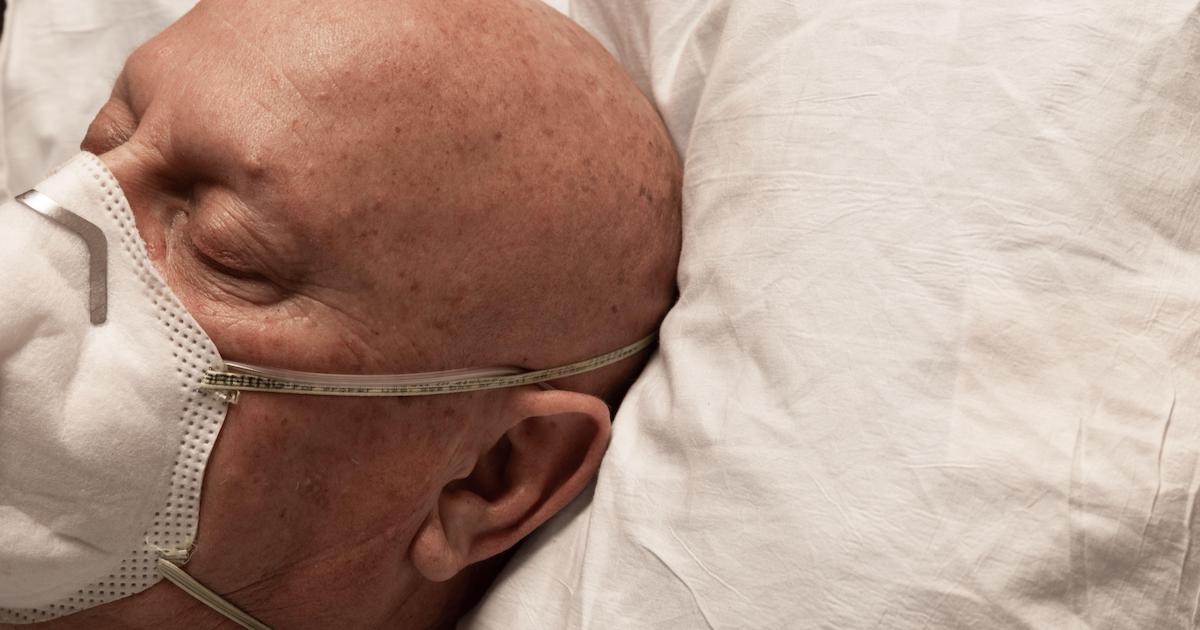It’s not clear whether bald people get more ill with Covid-19

14 May 2021
What was claimed
Bald men are twice as likely to suffer from severe Covid-19.
Our verdict
Being older raises the risk of severe Covid-19, but based on the research we have so far, it is not yet clear whether baldness itself has any effect.
The Sun, the Mail and the Mirror have all reported scientific research into a possible link between baldness and severe Covid-19.
All three newspapers said that bald men are about twice as likely to suffer from severe Covid. Obviously it is true that older men are more likely to be bald, and also more likely to suffer from severe Covid, but it is not yet clear whether baldness itself is linked with becoming more seriously ill with the disease.
Although it wasn’t clear in the articles, the newspapers were reporting on two pieces of research that were published last year, although the findings were presented again at a scientific conference earlier this month.
The first piece of research claimed to show a link between baldness and being hospitalised with Covid. This was a small study with some limitations, so the link may not be real.
The second piece of research claimed to show a link between a feature of a particular gene and being admitted to intensive care with Covid. This comes from an even smaller study, and it says nothing about whether the patients involved were actually bald, because it was their genes, not their hair, that was being measured.
Some of the newspapers incorrectly supposed that the second study was about baldness, not the genetic difference, but baldness and the genetic difference are “not strongly associated” according to one of the researchers.
What is the research about?
The first study looked at 175 patients admitted to hospital with Covid in Madrid during the first wave in the spring of 2020. About two thirds of these patients were men, and about 79% of these men had some degree of male pattern hair loss.
The researchers compared this to the prevalence of hair loss in an “age-matched” group of Caucasian men in another study, which they said was “estimated to be 31% to 53%”. In other words, they said men with hair loss were overrepresented among the few dozen that they studied in the Madrid hospitals.
It is possible that the newspapers’ claims that bald men were two or two-and-a-half times more likely to get severe Covid comes from a misreading of these figures, because 79% is about two-and-a-half-times larger than 31%, and about double 42%, which would be the middle of the 31-53% range.
If so, they have muddled up what these numbers mean. The figure of 79% represents the proportion of hospitalised men in the study who had hair loss, not the proportion of men with hair loss who went to hospital.
If the conclusions of the research were right, (and all men had the same chance of catching Covid), it would mean that bald men actually have more than double the average risk of being hospitalised. However, this study attracted some criticism when it appeared last year, because it is not clear whether the expected rate of baldness that it mentions is exactly right.
The study itself says: “The precise [baldness] rate in an age-matched, not-admitted population with COVID19 is still unknown to draw further conclusions.”
A Channel 4 fact check said at the time that the comparison in the study might not be precise enough to confirm a link between severe Covid and baldness.
What about the second study?
The second study, published last September, looked at one possible genetic difference that might explain the first study.
Someone’s chance of developing baldness is associated with their genes, including the androgen receptor gene (which affects a number of other things too). So the scientists thought that “variations in the [androgen receptor] gene may predispose male COVID-19 patients to increased disease severity”. In particular, they were interested in part of this gene called the “CAG repeat”, a repeated line of genetic code of varying length, giving what’s called a ‘CAG score’.
They split a small group of 65 men admitted to hospital with Covid into two categories, according to whether they had a low CAG score, or a high one. After 60 days, 45% of men with the low CAG score had been admitted to ICU, but it was 71% of men with a high CAG score. The second group were also likely to spend longer in hospital.
But the scientists did not record whether any of these men were actually bald. Professor Andy Goren, one of the authors of the study, told Full Fact: “The CAG repeat is actually not strongly associated with baldness directly.”
The average ages of the men in the two groups were similar (about 68 and 65), but the scientists did not ensure that they were similar in other ways. For instance, the men in one group may have had higher rates of heart disease or diabetes. This means that other differences between them, besides their CAG score might be more likely to explain their different risks of severe Covid.
According to Professor Goren, it was important not to exclude men with some diseases or conditions because the AR gene itself may also influence their risk of developing them. “Somebody with an androgen receptor sensitivity is more prone to have insulin sensitivity too,” he told us, “so it could be that these people also had more diabetes and more cardiovascular risk, and all that relates to the gene also. So we’re not saying that the baldness causes it, we’re saying that that gene is related to that.”
Other research has also suggested an association between someone’s CAG score and their Covid outcome.


